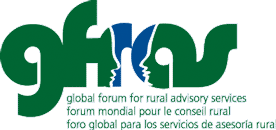Mission
The Policy Compendium follows the long-term goal to have the role of advisory and extension services (RAS) more prominently reflected in policies. In order to achieve this, stakeholders should be able to access both lessons learned from past experiences and practical tools in order to be able to effectively understand, advocate, design, implement, evaluate and adapt policies for rural advisory services.
History
Born from the idea to elaborate a guide for extension policy, the Policy Compendium was initiated by the GFRAS Policy Working Group and Modernizing Extension and Advisory Services (MEAS). The guide was to be designed as an open medium that provides easily accessible and understandable resources and tools for those working on and advocating for an enabling policy environment for RAS at different levels. The design of the Policy Compendium was informed by a survey held in October 2013 which identified that
-
There is a gap between priorities addressed by policies and the real challenges in the field.
-
Stakeholders have some experience in developing policies, but a general weak understanding of policies and policy processes – especially with regards to advocacy, dialogue, implementation and training.
-
There is a strong neglect of active advocacy for RAS policy which directly influences capacities and funding for RAS.
-
Even though countries and institutions have already elaborated literature, documentation, and policy documents on RAS, these are not shared widely enough.
-
There is a need for stronger guidance on policy processes at different levels.
The need for step-by-step guidance for different levels of knowledge (ranging from general explanations about RAS policies to concrete national examples), led to the Policy Compendium being designed as an interactive resource for information and exchange. The Policy Compendium is also linked to GFRAS’ efforts with regards to the Consortium on Extension Education and Training, which provides learning materials on policy advocacy for RAS actors, and to policy dialogues at regional and national level. Results from trainings and policy dialogues will feed back into the Policy Compendium, enriching it with up-to-date data for practitioners using it.
Target audience
While the Compendium remains useful for global and regional organisations, the target audience consists of people involved in advisory and extension services at national or even regional level. These include researchers, politicians, managers, policy makers on ministerial level, and particularly also front line extension personnel and extension programme managers. This is due to the fact that most policies in relation to RAS are developed and implemented at national level.
Involved stakeholders
The GFRAS Policy Compendium was initiated by the Global Forum for Rural Advisory Services (GFRAS) with the help of the Modernizing Extension and Advisory Services (MEAS). It is financially supported by SDC, GIZ, USAID, and GFAR.
The GFRAS Policy Working Group, coordinated by Sithembile Ndema from FANRPAN and Natalie Ernst from the GFRAS Secretariat, is responsible to ensure the quality of the contents as well as its further development.


Comments
Stay up the good work! You know, a lot of people are searching around for
this information, you could aid them greatly.
my website - Top latest Five advocates Urban news: https://goo.gl/maps/vxaQsnJnDHQ2
Your articles are awesome, you only need more new visitors.
I know a method that can cause a viral effect on your website.
Search in google: dracko's tricks make your content go viral
Check out my homepage - 79Marco: https://Brodiefat.blogspot.se